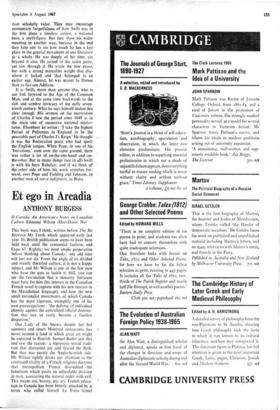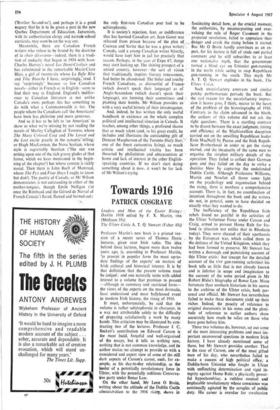Et ego . in Arcadia
ANTHONY BURGESS
This book was, I think, written before The Bit Between My Teeth, which appeared early last year. Its British publication seems to have been held back until the centennial fanfares and Expo 67. Rightly; we need ample preparation before thinking about Canada : any old time will just not do. From the angle of its divided and mainly thwarted culture, it is not a happy subject, and Mr Wilson is one of the few men who have the guts to tackle it. Still, you can see the fascination that a minority literature must have for him (his interest in the Canadian French novel is cognate with his new interest in the Macedonian language), and how the new small nationalist movements, of which Canada has the most vigorous, exemplify one of his own preoccupations: 'the defense of individual identity against the centralized official domina- tion that can so easily become a faceless despotism.'
Our Lady of the Snows, despite her hot summers and smart Montreal restaurants, has never seemed a land in which great art might be expected to flourish. Samuel Butler saw this and saw the reason: a repressive moral tradi- tion that distrusted joy and feared the flesh. But that was purely the Anglo-Scottish side. Mr Wilson rightly draws our attention to the continued vitality of a French religious doctrine that metropolitan France discredited—the Jansenism which posits an unhealable division in man, associating the natural order with evil. This means sex, beauty, joy, art. French educa- tion in Canada has been bitterly attacked by a monk who called himself Le Frere Untel (`Brother So-and-so'), and perhaps it is a good augury that he is to be given a post in the new Quebec Department of Education. Jansenism, with its authoritarian clergy and narroasschool curricula, may soon be on the way out.
Meanwhile, there are Canadian French writers who refuse to be bound by the doctrine of la chair decevante—indeed, there is a tradi- tion of audacity that began in 1934 with Jean- Charles Harvey's novel Les Detni-Civilises and has culminated in the remarkable Marie-Clare Blais, a girl of twenty-six whose La Bile Bete and Tete Blanche I have, surprisingly,. read. I say 'surprisingly' because so few Canadian novels—either in French or in English—seem to find their way to England. England's indiffer- ence to Canadian literature is not unlike Canada's own; perhaps this has something to do with what a Commonwealth is for. The people whom the Canadians call 'the Americans' have been less philistine and more generous.
And so it has to be left to 'an American' to show us what we're missing by not reading the novels of Morley Callaghan of Toronto, whose The Many Colored Coat and The Loved and the Lost excite greatly in the synoptic-telling; or Hugh MacLennan, the Nova Scotian, whose style is regrettably Scottian (`The sUn was setting upon one of the rich grassy glades of that forest, which we have mentioned in the begin- ning of the chapter') but whose content is richly moral. Then there is John Buell of Montreal, whose The Pyx and Four Days I ought to know but don't. The poetry of Canada, so Mr Wilson demonstrates, is not outstanding in either of the mother-tongues, though Emile Nelligan Cat once the Rimbaud and the G6rard de Nerval of French Canada') flared, flamed and burned out: had better be abandoned. The bitter and touchy French s Canadians, as distrustful of Franca- (which doesn't speak their language) as of Anglo-Saxondom (which doesn't speak their language), are forming their committees and planting their bombs. Mr Wilson provides us with a very useful history of their intransigence.
And, indeed, he has written the only useful handbook in existence on the whole complex political and intellectual situation in Canada. It teaches, among other things, a profound shame that so much talent (and, to his great credit, he includes and illustrates the outstanding gift of Duncan Macpherson of the Toronto Daily Star,"; one of the finest cartoonists living), so much artistic and intellectual vitality has been thwarted by philistinism and obscurantism at home and lack of interest in the other English- speaking countries. If we don't start doing - something about it now, it won't be for lack of Mr Wilson's trying.































 Previous page
Previous page